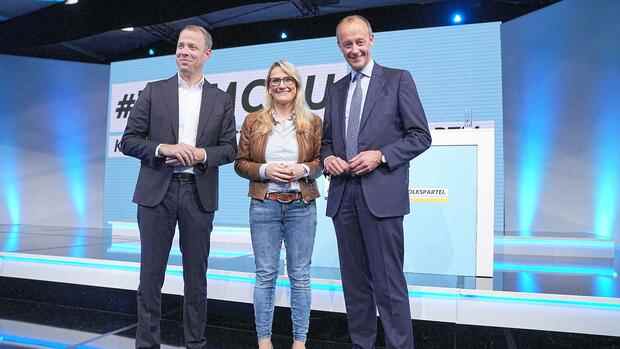Berlin It should be a different conference room, not the well-known federal press conference with its bright blue back wall. How many times has Angela Merkel sat there, how often did one of his challengers, most recently Norbert Röttgen. And yes, the day of his official candidacy should also be something of guerrilla marketing.
That is probably why Friedrich Merz secured the domain teamcdu.de and immediately after his official nomination on Monday evening he started a countdown for a press conference in the local Hochsauerlandkreis: on Tuesday afternoon in Berlin, not in Mitte, but in the Neukölln Großhotel Estrel, Sonnenallee . “#Teamcdu – Clear course. For our People’s Party, ”is the Merz slogan.
The 66-year-old from the Sauerland is now officially running for the third time for the CDU chairmanship – and no longer alone, like the first two times. In 2018, he didn’t even consider it necessary to woo the delegates of the federal party congress in advance – Annegret Kramp-Karrenbauer won. The second time, in January of this year, Merz called at least significantly more and came second again – behind Armin Laschet. This time everything is different.
It is 3 p.m., Tuesday afternoon, Estrel, Berlin: “There will be no axis shift with me,” clarifies the icon of the economic wing. The CDU should “become a people’s party in the best sense of the word” again. Merz doesn’t want to polarize.
Top jobs of the day
Find the best jobs now and
be notified by email.
It could be his chance to win the race against the other candidates: Chancellery Minister Helge Braun and foreign politician Norbert Röttgen. He had brought the new Hamburg member of the Bundestag Franziska Hoppermann with him as his candidate for the office of Secretary General to his presentation at the federal press conference last Friday and made it clear: “The CDU can never be a party in the direction. Then we are lost. “
In the future there will be two general secretaries
The other, Helge Braun, is promoting a “fundamental new beginning”, even if, as the Executive Minister of the Chancellery, he is responsible for the policies of his boss Angela Merkel like no other. He wants to unite the currents. Both Braun and Röttgen know how important the role of Friedrich Merz is. So, as a precaution, they both want to give him a prominent role.
But Merz has his own plan: “I would like to introduce you to a few people,” begins Merz in the Estrel. Next to him are Mario Czaja and Christina Stumpp, both newly elected to the Bundestag. Czaja is to become general secretary. The Berliner has socio-political competence, advertises Merz. In fact, the 46-year-old was the health senator in the capital from 2011 to 2016.
Stumpp is to become the deputy general secretary, the office would be a novelty in the CDU. The woman from Waiblingen turned 34 on this day. “She will represent the local political side so that we can grow more strongly in the municipalities and districts,” announced Merz. Stumpp speaks out against the women’s quota, Czaja in favor.
Merz also introduces his preferred group for the deputy party chairmen: They should “become visible and take on issues” – as is actually normal in a party and as the CDU has been criminally neglecting for years.
The acting deputy Silvia Breher should be one of them, as well as the Schleswig-Holstein Education Minister Karin Prien and the Saxon Prime Minister Michael Kretschmer. Carsten Linnemann is also likely to be a candidate. The head of the SME and Economic Union (MIT) had signed a pact with Merz weeks ago.
Linnemann is to receive a prominent position
Linnemann could become chairman of the basic program commission, Merz promises. So there is no more space for another North Rhine-Westphalia. Jens Spahn has to give way and content himself with the position of vice-parliamentary group. Whether Merz also wants to become parliamentary group leader? He still owes the answer. Ralph Brinkhaus is elected until April. Merz wants to give “new answers to new questions”. Fast. “We have to win the elections next year.”
In Saarland, Schleswig-Holstein and North Rhine-Westphalia, the CDU should continue to provide the prime ministers. Merz is breathing heavily while he talks, the appearance is important to him. At the back of the screen, other followers are watching via video conference. “#Teamcdu” is always shown.
He addresses the topics that are important to him: climate change, “Germany as a business location” and foreign policy. And then it comes to what it is not associated with: social justice. “We have no answer to how the social security systems work in view of the rapid change in the world of work,” he analyzes. A chairman cannot decide all these issues alone. “This requires a team.”
Does he also want to be the candidate for chancellor in 2025? “We make this decision much later,” says the 66-year-old. The next two years will be about “repositioning ourselves”. Around 400,000 members will vote on the chairmanship.
Merz is considered the big favorite. Candidates have until December 2nd to advertise themselves. The party wants to announce the result on December 17th, if necessary there will be a runoff election, which will end on January 14th and the result will then be confirmed by a federal party conference in Hanover.
More: Who will succeed Laschet? Questions and answers on the election of the future CDU party leader
